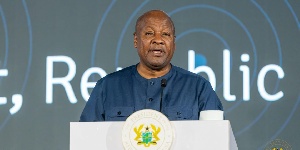
Mahama Dismisses GHS 4 to $1 Projection as Unrealistic, Calls for Balanced Exchange Rate to Support Exports
Former President John Dramani Mahama has described projections of the Ghanaian cedi strengthening to GHS 4 against the US dollar as “unrealistic,” arguing that such a valuation would be detrimental to the country’s export-driven sectors.
In a recent meeting with the Governor of the Bank of Ghana and the Minister for Finance, Mahama discussed the current and projected value of the cedi. The consensus from the discussion placed the realistic value of the cedi between GHS 10 and GHS 12 to the dollar, based on prevailing economic indicators.
Speaking to members of the Federation of Associations of Ghanaian Exporters (FAGE), Mahama emphasized that while the cedi has seen some recent stabilization, there is a need for a balanced and pragmatic approach to managing its value. According to him, maintaining the exchange rate within the GHS 10–12 range would benefit the economy by supporting Ghanaian exporters while avoiding a flood of cheap imports.
“The cedi has stabilized above GHS 10 due to interventions such as the forex auction,” Mahama said. “This stability is good, but pushing it down to GHS 4 would severely hurt our exporters by making our goods less competitive internationally.”
He pointed out that the recent marginal strengthening of the cedi and depreciation of the dollar have already impacted trade, making imports cheaper and exports more expensive—posing a challenge for local producers.
Mahama also noted that while a stronger cedi can bring benefits, such as reduced fuel and transportation costs, which are advantageous to both importers and exporters, policymakers must be cautious not to overvalue the currency.
He urged importers to consider the broader economic implications of an overly strong cedi and called for policies that strike a fair balance between boosting exports and managing the cost of imports.
“An exchange rate of GHS 10 to GHS 12 encourages exports, supports jobs, and protects our economy from becoming overly reliant on imports,” Mahama stated.





